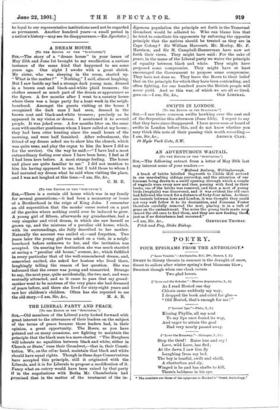THE LIBERAL PARTY AND PEACE.
[TO THE EDITOR OF TEE "SPECTATOR."]
SIR,-Old members of the Liberal party looked forward with great interest to the utterances of their leaders on the subject of the terms of peace because those leaders had, in their opinion, a great opportunity. The Boers, as you have pointed out on many occasions, are fighting to maintain the principle that the black man is a mere chattel. "The Burghers will tolerate no equalities between black and white, either in Church or State," runs their Grondwet,—that is, their Consti- tution. We, on the other hand, maintain that black and white should have equal rights. Though in these days Conservatives have accepted this principle, still it originated with the Liberals, and it is for Liberals to propose a modification of it. Fancy what an outcry would have been raised by that party if in the negotiations with Botha Mr. Chamberlain had promised that in the matter of the treatment of the in-
digenous population the principle set forth in the Transvaal Grondwet would be adhered to. Who can blame him that he tried to conciliate his opponents by enforcing the opposite principle that the natives should be treated as they are in Cape Colony F Sir William Harcourt, Mr. Morley, Mr. P. Harrison, and Sir H. Campbell-Bannerman have now set forth their views. They might have said : For the sake of peace, in the name of the Liberal party we waive the principle of equality between black and white. They might have proposed some compromise. They might have at least encouraged the Government to propose some compromise. They have not done so. They leave the Boers to their belief that on the principle for which they have been contending, and often fighting, for one hundred years the British people will never yield. And so this war, of which we are all so tired,










































 Previous page
Previous page